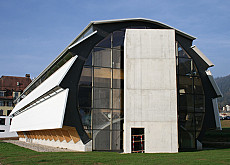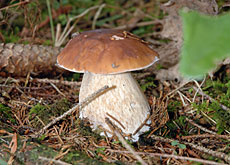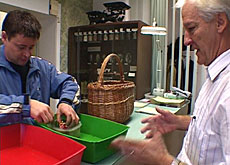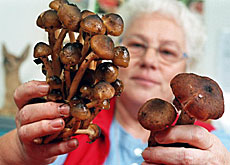New centre provides seeds of knowledge

A unique European mushroom centre opened on Saturday near Neuchâtel in western Switzerland, aiming to answer all kinds of fungi-related queries.
Mycorama in Cernier has been over ten years in the making, finally overcoming a series of political and financial hurdles that often seemed insurmountable to its initiators.
Autumn is the mushroom-collecting season in Switzerland. At weekends large numbers of people forage through the woods, basket in hand, in search of an often elusive – and edible – prize.
The Jura mountains are a prime location for mushroom hunting. So it is perhaps not so surprising that the new mycological centre is opening off the beaten track on Saturday in the Val-de-Ruz village of Cernier.
The building itself looks a bit like a mushroom. Inside, large areas have been set aside for temporary and permanent exhibits.
Unfortunately some of it will remain empty for the time being. Last-minute financial woes, including the bankruptcy of one of the suppliers, have forced the promoters to change some of their plans.
This has not dented their enthusiasm, however. It took more than ten years to get the centre – the only one of its kind in Europe – up and running, mainly because the project took a long time to get through the approval process and receive state and local subsidies.
Academic interest
Jean Keller, the outgoing director, has been pushing the project since the mid-1990s. He says academic – not culinary – fascination has driven the group behind the Mycorama.
“When you’ve studied mushrooms once, it’s hard to get away from them,” he told swissinfo. “There are so many things to consider that it would take more than a lifetime to understand them.”
According to Keller, a retired science teacher, one of the difficulties in setting up the centre was convincing people that mycology is a worthwhile pursuit.
“For a long time even at universities mycology was considered to be of minor interest, even though mushrooms have been studied for centuries,” he said. “It was just a sideline to botany, before being shifted to microbiology and then biotechnology.”
Practical applications
Despite this, mycological research has led to the development of antibiotic drugs such as penicillin. Mycology also has applications in the dairy, wine and baking industries as well as in the production of dyes and inks.
“We want to inform people about mushrooms because schools provide students with little or bad information about them,” said Keller. “People know almost nothing – even if they come across mushrooms every day and don’t realise it.”
The centre will provide visitors with information about the biology and uses of mushrooms. However, there will be no on-site production for the time being, nor any cooking lessons.
The promoters are hoping that mushrooms’ particular aura will attract visitors.
“Their shapes are strange, unlike anything else,” said Keller. “Their colours can change very quickly, appearing and disappearing – some years they don’t even grow. All these small elements put together mean that mushrooms remain somewhat mysterious.”
swissinfo, Scott Capper in Cernier
Estimated global cost of Mycorama centre: SFr10 million ($8.5 million)
Visitors: target of 20,000 a year
Mycology is the study of fungi, their genetic and biochemical properties, their taxonomy, and their use to humans, as well as their dangers, such as poisoning or infection.
The most comprehensively studied and understood fungi are yeasts.
Many fungi produce toxins, antibiotics and other secondary substances.
They are considered fundamental for life on earth because of their interaction with other forms of life. They also play a role in the global carbon cycle.

In compliance with the JTI standards
More: SWI swissinfo.ch certified by the Journalism Trust Initiative



You can find an overview of ongoing debates with our journalists here . Please join us!
If you want to start a conversation about a topic raised in this article or want to report factual errors, email us at english@swissinfo.ch.